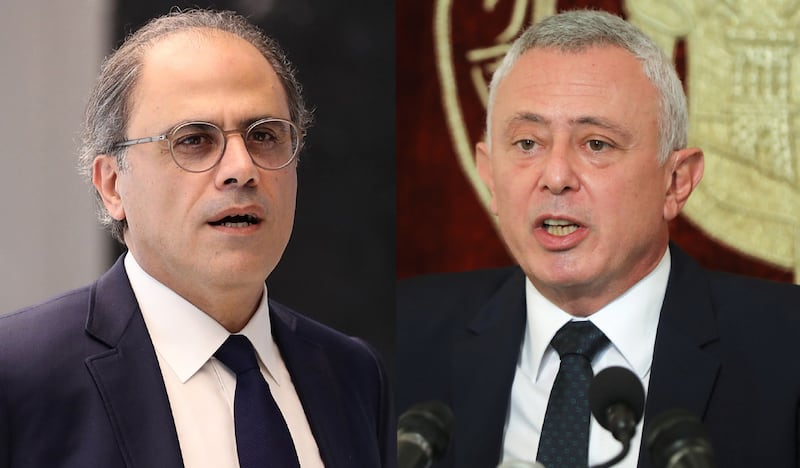Last November, Hezbollah’s secretary general, Hassan Nasrallah, described the president of Lebanon that his party wanted to see in office. Hezbollah sought “a president who would reassure the resistance”, and “who would not stab the resistance in the back”.
In issuing his conditions, Nasrallah forgot one key detail. In Lebanon’s sectarian system, the president is chosen from the Maronite Christian community, so for a Shiite political figure to set conditions on who should fill a major non-Shiite national post represented a risk. In early March, Nasrallah formally endorsed Suleiman Franjieh as Hezbollah’s candidate, showing the kind of candidate the party favoured.
When Mr Franjieh was broadly rejected by a panoply of major Christian parties, including Hezbollah’s ally the Free Patriotic Movement (FPM), the Shiite party did not budge. On the contrary, last month, when the FPM and its major rivals, the Lebanese Forces and the Kataeb Party, all agreed to back Jihad Azour as an alternative candidate to Mr Franjieh, Hezbollah’s reaction was anger.
The head of the party’s parliamentary bloc, Mohammad Raad, declared that Mr Azour was the candidate of “some in Lebanon who had the necessary impertinence to publicly declare their rejection of the candidate of the resistance axis [mumanaa]”, in favour of a candidate of “submission”.
What Mr Raad, and Hezbollah in general, refused to acknowledge was that the rare show of Christian unity was made possible because communal representatives did not want the leading Maronite post in the state to be selected by the Shiite duo – Hezbollah and the allied Amal Movement, led by Speaker Nabih Berri.

Yet without Christian cover, Mr Franjieh’s chances of being elected are low. None of the major non-Christian parties relish forcing a president on a community that doesn’t want him. Doing so could have severe repercussions for sectarian coexistence, isolate Mr Franjieh, crippling him politically, and lead to a counter-reaction against Shiite candidates backed by Hezbollah and Amal in the future.
On June 14, Lebanon’s parliament convened to elect a president, but neither Mr Franjieh nor Mr Azour won a two-thirds majority needed to win in a first round of voting. Both broad alignments also threatened to deny a quorum to prevent a second round of voting, when only an absolute majority is required for victory. This is what Hezbollah and Amal did to deny Mr Azour, who had won more votes than Mr Franjieh.
In other words, Lebanon is unlikely to have a president until the major parties in the country – which means Lebanon's major sectarian groups – can agree on a compromise candidate. In light of this, Hezbollah’s anger with the way the Christians managed to unite in opposition to Mr Franjieh may have a more prosaic explanation.
Realising that Mr Franjieh is not electable in light of his Christian isolation, Hezbollah may have fallen back on the only tactic available to it – responding with aggressiveness in order to strengthen its hand in negotiations over a third candidate. From the start, it seems, this may have been the party’s strategy, when it announced that its only candidate was Mr Franjieh. The aim was, simply, to extract a high price for giving up on him.
Hezbollah also had a second objective. It wants to show Mr Franjieh, an old ally who has been faithful in his relationship with the party, that it did all it could to bring him to office. Mr Franjieh is close to the Syrian regime, and Hezbollah does not want potential tensions with Damascus by moving too readily towards a fallback candidate.

However, that doesn’t change the fact that the party will have to take sectarian factors into consideration when opting for someone else. Any serious candidate will need to secure communal legitimacy by having the support of at least one of the major Christian parties. Since Hezbollah is especially hostile to the Lebanese Forces, it would probably prefer any Christian blessing for a candidate to come from the FPM.
The major question is what happens next in the presidential election saga. What is needed for a breakthrough is a complex package deal on the presidency, prime minister, and governor of the Central Bank, involving local, regional and international actors. For a third candidate to emerge, someone within Lebanon will have to play a mediating role, finding and marketing a candidate who can appeal to both sides of the local and regional divide. A respected analyst in Beirut, Khaldoun Al Sharif, believes Mr Berri will be one of those who fulfils this local role, probably in conjunction with the Druze leader Walid Joumblatt.
This assessment makes sense for two reasons. Mr Berri is trusted by Hezbollah and therefore can persuade the party. Moreover, as speaker, he has the institutional means to rally a majority in parliament for such a candidate. Mr Joumblatt, in turn, can speak to Mr Franjieh’s opponents, controls a bloc in parliament that can swing the election decisively towards a given candidate, and has been critical of the Lebanese Forces leader, which has earned him a measure of approval from Hezbollah.
It was noteworthy that after the botched election of June 14, Mr Berri declared that the only way out of the deadlock was “dialogue, then dialogue, then dialogue”. It’s difficult not to assume that the speaker was defining a role for himself as godfather of such a dialogue, and his old and close ties with Mr Joumblatt suggest he may not act alone.





